Lessons from the past: framing post-war immigration in Germany by historical analogies
In many West European countries, the experience of mass immigration after 1945 was perceived as something basically new and unprecedented. In the lengthy process of coming to terms with the new situation and of developing a self-understanding as countries of immigration and of ethnic pluralism, historical arguments often played an important role. By placing present-day immigration into a historical perspective, by constructing narratives of continuity (and discontinuity) and not least by presenting persuasive historical analogies, historians (and others) introduced arguments that informed the debates of the day and allowed the experiences of immigration and multi-ethnicity to be integrated into (national) narratives of identity. The German case is particularly interesting in this respect, since a tradition of tolerance and successful integration had to be invented in spite of the fresh memories of the Nazi-past that were witness to the contrary.
 Christhard Hoffmann (born 1952 in Luneburg, Germany) is a German historian and professor of modern European history at the University of Bergen. In the period 2007-2013 he was Head of the Department of Archaeology, History, Cultural Studies and Religion.
Christhard Hoffmann (born 1952 in Luneburg, Germany) is a German historian and professor of modern European history at the University of Bergen. In the period 2007-2013 he was Head of the Department of Archaeology, History, Cultural Studies and Religion.
Hoffmann defended in 1986 his doctoral dissertation on German Antiquity historians’ representation of Jews and Judaism in the 19th and 20th centuries [1] at the Technische Universität Berlin, where he also worked as a researcher for many years. From 1994 to 1998 he was a visiting professor at the University of California, Berkeley, and since 1998 he has worked at the University of Bergen.
Hoffmann has an extensive list of publications in the fields of German-Jewish history and cultural history, history of anti-Semitism and migration history.
Communicating Migration Seminar series
The IMER seminar series for 2014 will cover how migration and ethnic relations are communicated in every-day encounters, in mass and social media, in politics and in teaching at the universities. Has the way people talk about migration and migrants in different social contexts changed over time, and in which ways has it changed? How does migration theory and research fit in with other topics and theories in the social sciences, and how do results from migration research inform public debate and policy development?
Communicating migration will be discussed from various angles in our seminar series on international migration and ethnic relations during spring and autumn 2014. We welcome papers that touch upon this broad theme from different angles. Historical analyses of change over time in regard to politics and public debate, research foci and disciplinary concerns are specifically welcomed.
COMMUNICATING MIGRATION SEMINARS: ESPEN HELGESEN – “Your dad is looking for you” – Children’s perspectives on state intervention in immigrant families in Norway
Several recent international news stories have described state-initiated forced separation of children and parents in Norway, illustrating how local decisions in the Child Welfare Service can have widespread ramifications outside the families involved. In this paper I draw on ethnographic fieldwork among immigrant families in Kristiansand, Norway, to show how a group of children responded when one of their friends suddenly disappeared. The secrecy surrounding the inner workings of the Child Welfare Service led the children to frame the incident as a “kidnapping”, and several children expressed fear that they, too, would be separated from their families. Frustrated with the lack of an explanation of what had happened to their friend, the children turned to online worlds, where they could express their fears and concerns by sharing artwork with friends outside the adult gaze.
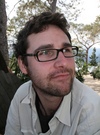 Espen Helgesen is a PhD candidate at the Department of Social Anthropology, University of Bergen, currently finishing his thesis on technology-mediated sociality and self-formation among children of immigrants in Norway.
Espen Helgesen is a PhD candidate at the Department of Social Anthropology, University of Bergen, currently finishing his thesis on technology-mediated sociality and self-formation among children of immigrants in Norway.
Communicating Migration Seminar Series IMER Bergen spring and autumn 2014
The IMER seminar series for 2014 will cover how migration and ethnic relations are communicated in every-day encounters, in mass and social media, in politics and in teaching at the universities. Has the way people talk about migration and migrants in different social contexts changed over time, and in which ways has it changed? How does migration theory and research fit in with other topics and theories in the social sciences, and how do results from migration research inform public debate and policy development? Communicating migration will be discussed from various angles in our seminar series on international migration and ethnic relations during spring and autumn 2014. We welcome papers that touch upon this broad theme from different angles. Historical analyses of change over time in regard to politics and public debate, research foci and disciplinary concerns are specifically welcomed. The seminar series will end with a two-day conference in October/November 2014.
IMER Seminar:
Elaine Chase and Jenny Allsopp: The ‘tactics’ of time and status: Young people subject to immigration control making the transition to ‘adulthood’ in the UK
Young people who arrive in the UK from outside Europe without a parent or legal guardian are institutionally categorised according to a range of possible legal statuses and usually afforded time-limited Leave to Remain in the UK. These categorisations are associated with specific welfare entitlements which tend to diminish over time and become particularly uncertain as young people transition into ‘adulthood’. Situated within a broader research programme examining the link between migration, ‘wellbeing’ and ‘futures’, this paper examines the multiple transitions imposed on young people subject to immigration control as they approach the age of 18 and beyond, (from child to ‘adult’, from being accorded a temporary residence permit to more permanent leave to remain or from legality to ‘illegality’) and the implications for their access to various dimensions of welfare provision. The paper shows how different components of the ‘state’ have time limitations at their disposal to control access to welfare and state support according to chronological age. From young people’s perspectives, such ‘tactics’ fundamentally control their trajectories and future prospects unless they can formulate strategies of their own to counter such tactics.
Read more about Elaine Chase here
Read more about Jenny Allsopp here
Plural policing and the safety–security nexus in urban governance
Based on a study of policy frames in urban politics in Sweden, Malmö in particular, this article discusses the safety–security nexus in urban governance. It argues that perceived safety figures as an index of order and integration, and security becomes part and parcel of an expanded cohesion agenda which chain-links criminal justice, immigration control and civic integration. The expanded cohesion agenda in urban governance involves plural urban policing enabled by partnership agreements between the police and local authorities. The article demonstrates how force-based, pre-emptive crime-fighting is intertwined with preventative empowerment programmes; the ‘will to power’ is embedded in ‘the will to empower’. The preferred solution to social problems is extended force-based policing in combination with more police involvement in ‘social’ governance. It is argued that the expanded social cohesion agenda works to ‘criminalize’ specific subpopulations by replacing ‘social’ welfare politics with crime prevention programmes. Under an expanded cohesion agenda, crime prevention has less to do with preventing people from violating the law and more to do with securing the social order. Moreover, it is argued that security politics relates to a broader urban politics aimed at nurturing prosperous diversity considered to benefit the city as a whole, at the cost of problematic difference. In conclusion the article argues that urban security politics lends itself to old welfare state structures, even as responsibility for social crime prevention is devolved ‘downwards’ and distributed across and array of agencies. The social democratic legacy – the revised welfare state – seems to offer favorable conditions for plural policing of minority groups in the city.
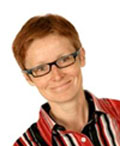 Randi Gressgård is professor at the Centre for Women’s and Gender Research (SKOK), and affiliated with the research unit International Migration and Ethnic Relations (IMER), University of Bergen. Her research interests include migration & minority studies, gender & sexuality studies and urban studies. Among her recent publications are Multicultural Dialogue: Dilemmas, Paradoxes, Conflicts (New York and Oxford: Berghahn Books, 2010/2012) and ‘The power of (re)attachment in urban strategy: Interrogating the framing of social sustainability in Malmö’ (Environment and Planning A 2014, vol. 46).
Randi Gressgård is professor at the Centre for Women’s and Gender Research (SKOK), and affiliated with the research unit International Migration and Ethnic Relations (IMER), University of Bergen. Her research interests include migration & minority studies, gender & sexuality studies and urban studies. Among her recent publications are Multicultural Dialogue: Dilemmas, Paradoxes, Conflicts (New York and Oxford: Berghahn Books, 2010/2012) and ‘The power of (re)attachment in urban strategy: Interrogating the framing of social sustainability in Malmö’ (Environment and Planning A 2014, vol. 46).
Lisa Kings: Contesting urban management regimes: The rise of urban justice movements in Sweden
Addressing segregation, racism and welfare transformation, a new form of grassroots mobilization among young adults is emerging in the peripheries of Swedish cities. The common denominator is that they define themselves as urban justice movements– with place as the social ground for mobilization. Witha Gramscian perspective, the article analysis the rise of urban justice movements in relation to contemporary urban policies in Sweden. We argue that Swedish urban policies during the last 20 years have created a hegemonic urban management regime underpinned by area based programs with a focus on network steering and new forms of partnership between civil society and public institutions. The emergence of urban justice movements is here understood in relation to firsthand negative experience of– and later active revulsion from– having participated in activities and issues related to the urban management regime. These experiences and the later proclaimed autonomy of the movements have been a key condition for the beginning of a broader struggle that merges local rootedness with wider structural-institutional conditionality. (co-authored by Aleksandra Ålund (Linköping University) and Nazem Tahvilzadeh (KTH Royal Institute of Technology).
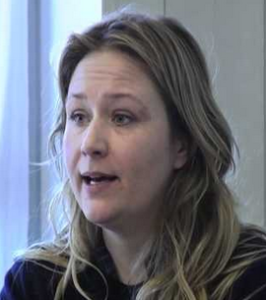 LISA KINGS holds a PhD in Sociology at Søderthorn University College. Her researh interests are urban theory, social movements, inequality and everyday life. (lisa.kings@sh.se)
LISA KINGS holds a PhD in Sociology at Søderthorn University College. Her researh interests are urban theory, social movements, inequality and everyday life. (lisa.kings@sh.se)
Vanja Lozic: Problematizing parents, governing troubled youth
The paperfocuses on current debate on troubled youth, living in socio-economically deprived suburbs in Sweden, and particularly discourses on problems of alienation, crime, arson and anti-social behaviour among youth. In the paper, interviews with the representatives of different organisations involved in managing the youth problem are analysed. One recurring theme in the interviews is problem discourses representing the parent as a problem. Departing from Foucault´s understanding of governmentality and the formation of subjectivity, we analyse the construction of problems, problematization, and conceivable solutions, as depicted by the interviewees. The problematizations recurring in the interviews are the deficiency of urban space, dysfunctional family relations and parents as being passive and culturally different. On the basis of such problematizations the interviewees propose solutions in various ways fostering the parents to become responsible and active subjects, who have internalised current norms and values. Other central solutions emerging in the interviews are the development of various forms of communicative skills as well as a range of pre-emptive measures targeting the parents. An important conclusion in the paper is that this way of developing possible solutions to the problems of suburban youth tends to focus on the transformation of individual parents, while structural dimensions get out of focus. What appears is a desire to foster parents and thus to produce a certain kind of subject, namely an active, responsible and cooperative individual, involved in the local community. (The paper is co-authored with Magnus Dahlstedt.)
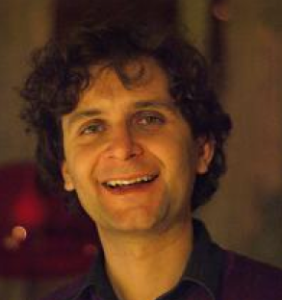 Vanja Lozic holds a PhD in history and issenior lecturer in Science of Education at Kristianstad University, Sweden. His research deals with issues in education from the perspectives of ethnicity, multiculturalism, gender, disability, youth cultures and work integrated learning. At present, he is participating in a research project “Cooperation, education and inclusion in multi-ethnic urban settings”, which concerns the connections between institutional restructuring, youth resistance and strategies for social inclusion. The aim is to investigate the measures for social inclusion within schools, local institutions and civil society actors in socioeconomically deprived areas of large cities in Sweden
Vanja Lozic holds a PhD in history and issenior lecturer in Science of Education at Kristianstad University, Sweden. His research deals with issues in education from the perspectives of ethnicity, multiculturalism, gender, disability, youth cultures and work integrated learning. At present, he is participating in a research project “Cooperation, education and inclusion in multi-ethnic urban settings”, which concerns the connections between institutional restructuring, youth resistance and strategies for social inclusion. The aim is to investigate the measures for social inclusion within schools, local institutions and civil society actors in socioeconomically deprived areas of large cities in Sweden
Sara Kohne: The experience of change in culturally diverse urban areas. Examples from two districts in Berlin and Oslo.
During the last two decades, central inner city areas have constantly become more attractive to the middle class as places for living and leisure. It is especially because of their history and cultural diversity that these urban districts gain ”new” popularity. This development is, among other things, connected to larger processes of economic and societal change, such as globalisation and de-industrialisation, and it is often called gentrification – a process of urban transformation that results in the physical, sociocultural and economic upgrading of city districts.
In taking a qualitative oriented approach on two culturally diverse urban areas that are partly experiencing the process which has just been described, Kohne´s aim is to identify challenges and assets that are experienced by the residents living and working in such districts.
In her presentation, Kohne will present selected findings from her work with the areas Kreuzberg SO36 in Berlin and Grønland-Tøyen in Oslo. She will discuss them in a comparative context.
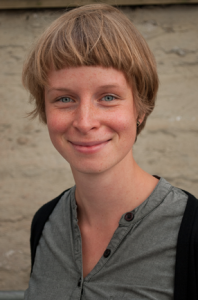 Sara Kohne is a PhD candidate in the discipline of Cultural Studies at the Department of Archaeology, History, Cultural Studies and Religion at the University of Bergen. Her research interests lie within the areas of cultural understandings of place, processes of change, and inequality in urban contexts.
Sara Kohne is a PhD candidate in the discipline of Cultural Studies at the Department of Archaeology, History, Cultural Studies and Religion at the University of Bergen. Her research interests lie within the areas of cultural understandings of place, processes of change, and inequality in urban contexts.
Redigert av Christine Jacobsen, Synnøve Bendixsen, Karl Harald Søvig
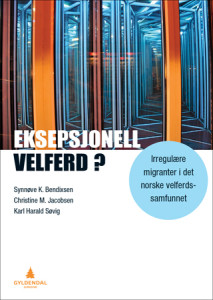 Irregulære immigranter har på noen områder full tilgang til velferdsytelser, men på mange områder er tilgangen svært begrenset enten i form av rettsregler eller andre barrierer. Denne antologien undersøker forholdet mellom rettslig rammeverk, institusjonell praksis og hvordan irregulære migranter selv erfarer sin situasjon.
Irregulære immigranter har på noen områder full tilgang til velferdsytelser, men på mange områder er tilgangen svært begrenset enten i form av rettsregler eller andre barrierer. Denne antologien undersøker forholdet mellom rettslig rammeverk, institusjonell praksis og hvordan irregulære migranter selv erfarer sin situasjon. Med en unik kombinasjon av juridisk og antropologisk blikk, går boken regelverket nærmere i sømmene, drøfter gatebyråkraters utfordringer og hverdagslivet til irregulære migranter og deres barn.
Hvilke regelverk får konsekvenser for irregulære migranters levevilkår? Hvordan blir dette regelverket forstått og etterfulgt av gatebyråkrater? Og hvordan blir hverdagslivet til irregulære migranter og deres barn påvirket av regelverket og dets fortolkning?
Denne boken er aktuell for velferdsprofesjoner som møter irregulære migranter som en del av sin yrkesutøvelse. Både leger, sykepleiere, helsesekretærer, lærere, helsesøstre, skolerådgivere, sosialarbeidere, sosionomer og barnevernspedagoger vil ha god nytte av Eksepsjonell velferd? Irregulære migranter i det norske velferdssamfunnet. Boken retter seg også mot frivillige organisasjoner som jobber med ulike aspekter ved migranters situasjon i Norge og andre som er engasjert i temaet.
Susanne Wessendorf: Pioneer migrants in a super-diverse context
Urban areas in Europe and beyond have seen significant changes in patterns of immigration, leading to profound diversification. This diversification is characterized by the multiplication of people of different national origins, but also differentiations regarding migration histories, religions, educational backgrounds, legal statuses and socio-economic backgrounds. This ‘diversification of diversity’ is now commonly described as ‘super-diversity’. Despite an increasing number of studies looking at how people live together in such super-diverse contexts, little is known about new patterns of immigration into such contexts. What are the newly emerging countries of origin which add to the diversification of already super-diverse areas? Where do recent migrants from unusual source countries, who cannot draw on already existing migrant or ethnic ‘communities’, find support? And what kinds of social networks do they form? This paper discusses pathways of settlement among recently arrived migrants from non-traditional countries of origin in the London Borough of Hackney. Drawing on earlier migration literature and the notion of ‘pioneer migration’, the paper addresses the challenges of analysing increasingly fragmented migration stories and pathways of settlement in super-diverse contexts.
Thomas Hylland Eriksen: The tension between superdiversity and cultural reproduction
From a bird’s eye perspective, Alna borough in eastern Oslo definitely looks superdiverse. Scores of languages are spoken in its population of 40,000, and its inhabitants come from about as many countries. Yet at the local level, social and cultural reproduction takes place to a great extent at the ethnic or community level. As one of our informants says, ‘I sometimes feel as though I am in Pakistan’. Had it not been for the strong presence of the Norwegian state, the suburb would have resembled the plural societies described in the mid-20th century by Furnivall and Smith, where ethnic groups, like pearls on a necklace, lead parallel lives but meet in the marketplace. How comprehensive is the influence of the state; in what ways does diversity in public affect the private sphere, and what are the main elements in the cultural reproduction of minority groups?
Echoes of race in Amsterdam
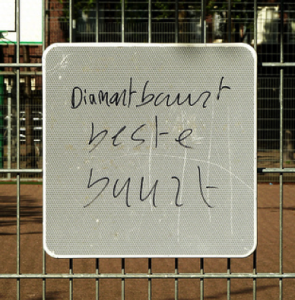 In this talk, I will discuss how racialized discourses on multicultural failure and the trouble with the children of migrants is taken up and contested in multicultural Amsterdam. Like in other Western European countries, multiculturalism backlash discourses have dominated public debates in the Netherlands since the 1990s. I ask how people who are framed as part of the problem engage the moral imperatives of such backlash discourses and the anxieties they broadcast. Amsterdam’s Diamantbuurt provides a good vantage point for such an exploration since the neighbourhoods’ unruly Moroccan-Dutch young men have played an important role in Dutch backlash discourses. How do Moroccan-Dutch Diamantbuurt residents, who are closely identified with these iconic bad guys, negotiate the dominant narrative regarding their neighbourhood? This article demonstrates that for these residents, the anxieties articulated in backlash discourses become the grounds for an anxious grappling with abjectness and identification.
In this talk, I will discuss how racialized discourses on multicultural failure and the trouble with the children of migrants is taken up and contested in multicultural Amsterdam. Like in other Western European countries, multiculturalism backlash discourses have dominated public debates in the Netherlands since the 1990s. I ask how people who are framed as part of the problem engage the moral imperatives of such backlash discourses and the anxieties they broadcast. Amsterdam’s Diamantbuurt provides a good vantage point for such an exploration since the neighbourhoods’ unruly Moroccan-Dutch young men have played an important role in Dutch backlash discourses. How do Moroccan-Dutch Diamantbuurt residents, who are closely identified with these iconic bad guys, negotiate the dominant narrative regarding their neighbourhood? This article demonstrates that for these residents, the anxieties articulated in backlash discourses become the grounds for an anxious grappling with abjectness and identification.
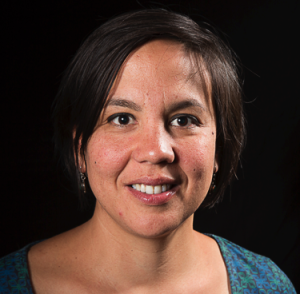 Anouk de Koning is assistant professor in Anthropology and Development Studies, Radboud University, Nijmegen, the Netherlands. She is the author of Global Dreams: Class, Gender and Public Space in Cosmopolitan Cairo (AUC Press, 2009) and, with Rivke Jaffe, Introducing Urban Anthropology (Routledge, 2016).
Anouk de Koning is assistant professor in Anthropology and Development Studies, Radboud University, Nijmegen, the Netherlands. She is the author of Global Dreams: Class, Gender and Public Space in Cosmopolitan Cairo (AUC Press, 2009) and, with Rivke Jaffe, Introducing Urban Anthropology (Routledge, 2016).
A light lunch will be served
CANCELED More infoermation about eventual repacements will be available sook
